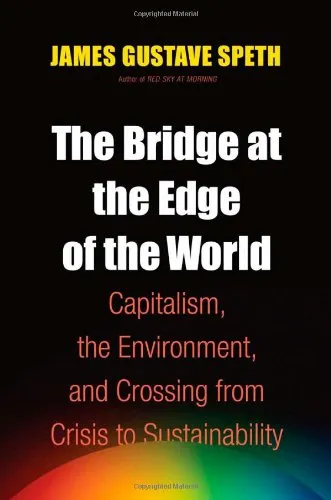The Bridge at the Edge of the World: Capitalism, the Environment, and Crossing from Crisis to Sustainability
3.8
بر اساس نظر کاربران

شما میتونید سوالاتتون در باره کتاب رو از هوش مصنوعیش بعد از ورود بپرسید
هر دانلود یا پرسش از هوش مصنوعی 2 امتیاز لازم دارد، برای بدست آوردن امتیاز رایگان، به صفحه ی راهنمای امتیازات سر بزنید و یک سری کار ارزشمند انجام بدینکتاب های مرتبط:
معرفی کتاب
کتاب «The Bridge at the Edge of the World: Capitalism, the Environment, and Crossing from Crisis to Sustainability» نوشته جیمز گوستاو اسپیث، یکی از آثار برجسته در حوزه محیط زیست و پایداری است که به بررسی چالشهای سیستمهای سرمایهداری و تاثیرات آن بر محیط زیست میپردازد. این کتاب با تحلیل عمیق و دقیق از وضعیت کنونی جهان در حوزه محیط زیست، تلاش دارد تا راهکارهایی برای عبور از بحران و حرکت به سمت پایداری ارائه دهد.
خلاصهای کامل از کتاب
جیمز گوستاو اسپیث در این کتاب، با استفاده از دادهها و شواهد فراوان، نشان میدهد که چگونه سیستم اقتصادی کنونی، که بر اساس رشد بیپایان و بهرهبرداری بیمحابا از منابع طبیعی طراحی شده، در حال تخریب محیط زیست و ایجاد فجایع زیستمحیطی است. او بیان میکند که برای نجات سیاره، نیازمند تحولی ریشهای در نحوه تفکر و رفتار اقتصادی خود هستیم. سرمایهداری در شکل کنونی خود نمیتواند با بحرانهای زیستمحیطی مقابله کند، مگر اینکه تغییرات اساسی در ساختار و عملکرد آن صورت گیرد.
اسپیث برای این منظور، مفاهیمی همچون اقتصاد دایرهای، استفاده پایدار از منابع طبیعی، و رویکردهای نوآورانه در تولید و مصرف را به عنوان راهکارهایی برای دستیابی به پایداری معرفی میکند. او همچنین به اهمیت مشارکت جهانی و تعهد سیاسی برای تحقق این هدف تأکید میکند.
نکات کلیدی
- ضرورت تجدیدنظر در سیستمهای اقتصادی و محیط زیستی جاری برای تضمین آیندهای پایدار.
- نقش کلیدی تغییرات سیاسی و اجتماعی در تسریع فرایند حرکت به سوی پایداری.
- اهمیت تفکر خارج از چارچوبهای سنتی و پذیرش راهکارهای نوآورانه از سوی جامعه جهانی.
- لزوم تضمین عدالت اجتماعی به عنوان بخشی از توسعه پایدار.
نقل قولهای معروف از کتاب
"ما باید جهانی خلق کنیم که در آن رشد اقتصادی و حفاظت از محیط زیست همزیستی کنند، نه آنکه در تضاد باشند."
"سرنوشت سیاره ما در دست خود ماست، و تغییر در دسترستر از همیشه است."
اهمیت این کتاب
کتاب «The Bridge at the Edge of the World» در دنیای امروز که با چالشهای زیستمحیطی فراوانی روبرو است، به عنوان منبعی ارزشمند و راهگشا برای محققان، سیاستمداران و عموم مردم محسوب میشود. این کتاب فراتر از ارایه انتقادات ساده از وضعیت کنونی، به طور موشکافانه به بررسی ریشههای مشکلات زیستمحیطی پرداخته و مسیرهایی برای عبور از بحران و رسیدن به پایداری ارائه میدهد. از این جهت، مطالعه این کتاب به همه افرادی که دغدغه آیندهای بهتر برای سیاره ما دارند، توصیه میشود.
Introduction to "The Bridge at the Edge of the World"
Welcome to the profound exploration of our environmental and economic crossroads in "The Bridge at the Edge of the World: Capitalism, the Environment, and Crossing from Crisis to Sustainability." This compelling narrative by James Gustave Speth challenges our conception of modern capitalism as it intersects with the glaring realities of environmental degradation. As the earth grapples with unprecedented ecological challenges, Speth elucidates the pressing need for a transformative change in how our global economy operates to foster sustainability and resilience.
Detailed Summary of the Book
In "The Bridge at the Edge of the World," Speth thoroughly investigates the systemic nature of environmental crises and the economic structures that exacerbate them. By dissecting the industrial growth model, the author reveals how economic practices and priorities, ingrained in contemporary capitalism, systematically undermine ecological stability. Speth argues that this relentless pursuit of economic growth at any cost has led to profound environmental, social, and ethical issues.
The book is divided into critical thematic analyses, including the failures of environmentalism as it traditionally stands, and presents the effectiveness of current political and business solutions. Speth is particularly focused on the limitations of what he terms 'weak reformism,' suggesting that incremental adjustments will not suffice to avert environmental collapse.
Instead, Speth advocates for 'transformative change' that calls for reimagining societal values and priorities. It involves crafting new strategies that align human development with ecological limits and acknowledges the intrinsic connections between human well-being and the health of our planet.
Speth envisions a future where economic decisions are rooted in stewardship and responsibility. The book outlines potential pathways towards achieving sustainable societies through local, national, and global restructuring of economic and governance systems.
Key Takeaways
- Current economic practices are fundamentally unsustainable and destructive to the environment.
- Incremental reforms are insufficient; radical, transformative change is necessary.
- A new economy must prioritize ecological preservation and human well-being over mere profit and growth.
- Sustainability demands approaching environmental problems with holistic, integrated strategies that consider social justice and ethical dimensions.
Famous Quotes from the Book
"We can no longer tinker at the margins of environmental protection; the system itself is the problem."
"Today's economic paradigm is a long-term recipe for planetary disaster."
"To achieve sustainability, we must embark on a profound transformation of our society."
Why This Book Matters
This book is a clarion call to action, compelling readers to reckon with the severe implications of inaction in the face of environmental imperatives. It matters because it moves beyond conventional green discourse, challenging deeply entrenched economic ideologies and advocating for a transformative shift towards ecological and social sustainability. Speth's insightful analysis and clear vision for a sustainable future offers indispensable guidance for policymakers, business leaders, and activists looking to make a substantive impact.
دانلود رایگان مستقیم
شما میتونید سوالاتتون در باره کتاب رو از هوش مصنوعیش بعد از ورود بپرسید
دسترسی به کتابها از طریق پلتفرمهای قانونی و کتابخانههای عمومی نه تنها از حقوق نویسندگان و ناشران حمایت میکند، بلکه به پایداری فرهنگ کتابخوانی نیز کمک میرساند. پیش از دانلود، لحظهای به بررسی این گزینهها فکر کنید.
این کتاب رو در پلتفرم های دیگه ببینید
WorldCat به شما کمک میکنه تا کتاب ها رو در کتابخانه های سراسر دنیا پیدا کنید
امتیازها، نظرات تخصصی و صحبت ها درباره کتاب را در Goodreads ببینید
کتابهای کمیاب یا دست دوم را در AbeBooks پیدا کنید و بخرید
1325
بازدید3.8
امتیاز50
نظر98%
رضایتنظرات:
3.8
بر اساس 0 نظر کاربران
"کیفیت چاپ عالی بود، خیلی راضیام"
Questions & Answers
Ask questions about this book or help others by answering
No questions yet. Be the first to ask!



